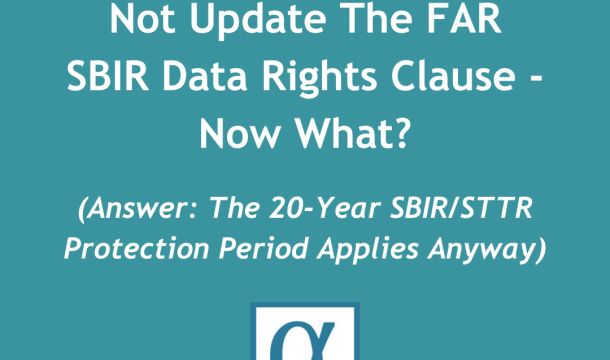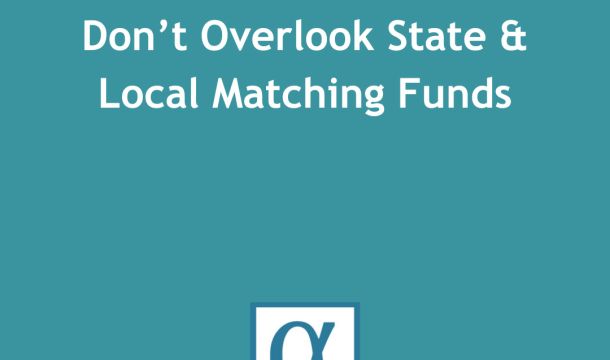The GovCon Bulletin™
The SBA’s 2022 Proposed Rule Changes - Part 3: Sole Source And Set-Aside Procurements For Tribally-Owned, ANC-Owned, NHO-Owned And CDC-Owned 8(a) Businesses
Sole Source Procurements For Tribally-Owned, ANC-Owned, And NHO-Owned 8(a) Businesses
The SBA regulation at 13 CFR 124.506 sets out a general requirement that 8(a) procurements above certain dollar thresholds must be open to competition among the participants in the SBA’s 8(a) Business Development (8(a) BD) program if there is a reasonable expectation of at least two fair market price offers from eligible participants. That regulation, however, exempts all sole source procurements for Tribally-owned or ANC-owned businesses, as well as sole source Department of Defense procurements for NHO’s, from this competition requirement.
According to the SBA, there was confusion about the provisions in 13 CFR 124.506(b)(3), which states that although sole source procurements for Tribally-owned, ANC-owned, or NHO-owned 8(a) businesses were not required to be competed, “a procurement may not be removed from competition to award it to a Tribally-owned, ANC-owned or NHO-owned concern on a sole source basis.” Some observers believed this meant that an 8(a) procurement that was competed among 8(a) BD participants could not have a follow-on requirement above the competitive dollar threshold that is awarded on a sole source basis to a Tribally-owned, ANC-owned or NHO-owned business.
In its Proposed Rule, the SBA makes clear that this was not the intent of the provision. Rather, as the SBA explained in the preamble to the Proposed Rule, the provision was meant only to apply to a “current” procurement and not a “predecessor” of a current procurement. In other words, a procurement that is solicited, or intended to be solicited, by an agency as an 8(a) set-aside open to 8(a) BD participants cannot be canceled or changed so that it can then be awarded on a sole-source basis instead. The SBA reasoned that a follow-on requirement is a new contracting action and as long as an agency has not evidenced an intent to issue it as an 8(a) procurement, it can be awarded on a sole-source basis.
The Proposed Rule, therefore, amends 13 CFR 124.506(b)(3), to state that a current procurement can not be removed from competition and awarded to a Tribally-owned, ANC-owned, or NHO-owned business on a sole source basis, but that a follow-on requirement to one that was previously awarded as a competitive 8(a) procurement may be awarded on a sole source basis to a Tribally-owned or ANC-owned business, or a business owned by an NHO for DoD contracts.
The SBA acknowledged the business development impacts of removing an incumbent 8(a) participant from competition for a follow-on procurement to a competitive 8(a) contract it previously performed under. The SBA explained in the Proposed Rule preamble that it may, therefore, take the impacts into account in its decision to accept a follow-on procurement on a sole source basis if the contract is critical to the incumbent 8(a) participant's overall business development. The SBA seeks comments on whether a specific provision should be added to the regulations to consider the business development effects on an incumbent 8(a) participant from the lost opportunity to compete for a follow-on contract.
Community Benefits Plan Reporting Requirements For Tribally-Owned, ANC-Owned, NHO-Owned, and CDC-Owned 8(a) Businesses
Currently, the SBA’s regulation at 13 CFR 124.604 requires Tribally-owned, ANC-owned, NHO-owned, and CDC-owned 8(a) businesses to submit to the SBA a report of benefits when they submit their annual 8(a) participant financial statements. The report of benefits must include information showing how the Tribe, ANC, NHO or CDC has provided benefits to the Tribal or native members and/or the Tribal, native or other community as a result of their participation in the 8(a) BD program through their 8(a) businesses. This information includes information relating to funding cultural programs, employment assistance, jobs, scholarships, internships, subsistence activities, and other services provided by the Tribe, ANC, NHO or CDC to the affected community.
Under the Proposed Rule, these 8(a) entities must still submit annually the report of benefits that contains the information described above. As amended by the Proposed Rule, 13 CFR 124.604 now requires the Tribes, ANC’s, NHO’s and CDC’s that own 8(a) businesses to have in place a Community Benefits Plan that outlines the anticipated approach they expect to deliver to strengthen their Native or underserved community. In addition, their 8(a) businesses are now required to include in the annual report of benefits whether the benefits that the Tribes, ANC’s, NHO’s or CDC’s provide meet the targets set forth in the Community Benefit Plans.
The SBA is requesting comments on how best to implement the proposed changes for benefits reporting, as well as comments on several specific issues related to the proposed changes, including: whether the Community Benefits Plan should be its own, separate plan or be included in the business plan submission and updates required as part of the annual review process; what period the Community Benefits Plan should cover; whether specific monetary targets should be established for providing support to the native or disadvantaged communities, and if that amount should change based upon the length of time an entity owns an 8(a) business and depending upon the number of 8(a) businesses an entity owns; and whether there should be consequences to an entity or an entity-owned 8(a) business that does not meet or does not make good faith efforts to meet the commitments that it made in its initial application to provide benefits to its native or underserved community.



